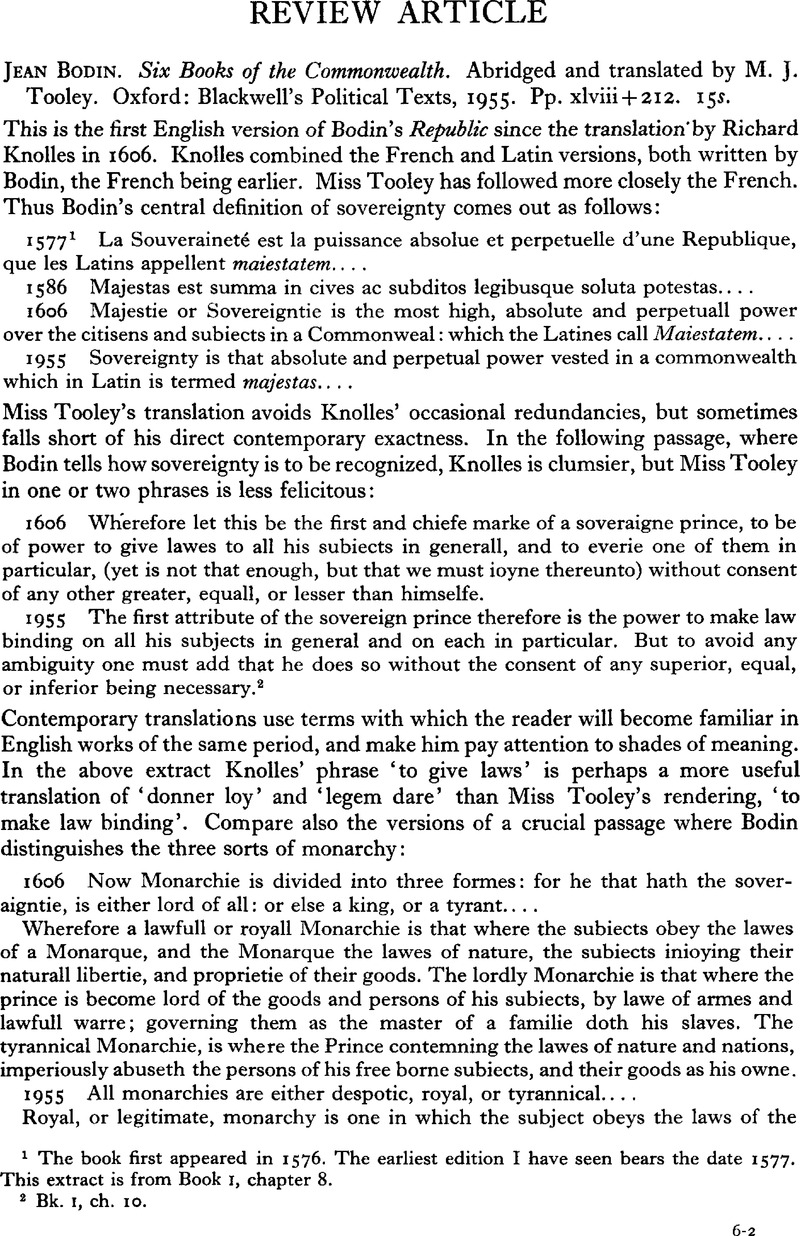No CrossRef data available.
Article contents
Published online by Cambridge University Press: 20 December 2011
Abstract

- Type
- Review Article
- Information
- Copyright
- Copyright © Cambridge University Press 1956
References
1 The book first appeared in 1576. The earliest edition I have seen bears the date 1577. This extract is from Book I, chapter 8.
2 Bk. I, ch. 10.
3 Bk. II, ch. 2.
4 In the French. The Latin has feudum, and iura feudorum are the rights exercised by a dominus.
5 In the same passage Miss Tooley has it that, after the invasions, ‘they then gradually established rights of overlordship’ (p. 58). A literal rendering of the French (the Latin agreeing) would be, ‘little by little they contented themselves with rights.…’ Miss Tooley's phrase seems to put the process in reverse.
6 Bodin's theoretical statement on covenants, Tooley, p. 30.
7 Miss Tooley's version says briefly (pp. 55–6): ‘Since the King of Poland has been compelled to share sovereign power with the nobility, that kingdom has never enjoyed any secure peace. The same is true of Sweden.…’
8 Tooley, p. 56.
9 Tooley, p. 28.
10 Tooley, p. 31.
11 Tooley, p. 35.
12 Tooley, p. 86: ‘If his instructions simply require him to execute an order, he has no option but to obey, except the letters be notoriously null and void, or contrary to the laws of nature, such as was Pharaoh's and Agrippa's commands to slaughter the innocents, or in our own days those of the Marquis Albert to rob and despoil the poor.’
13 Dunning, W., ‘Jean Bodin on Sovereignty’, Political Science Quarterly, XI (1896), pp. 82ff.CrossRefGoogle Scholar; History of Political Theories from Luther to Montesquieu (New York, 1905).Google Scholar
14 Hearnshaw, F. J. C., ‘Bodin and the Genesis of the Doctrine of Sovereignty’, in Tudor Studies, ed. Seton-Watson, R. W. (London, 1924).Google Scholar
15 Allen, J. W. in Social and Political Ideas of some great thinkers of the sixteenth and seventeenth centuries, ed. Hearnshaw, F. J. C. (London, 1926)Google Scholar; A History of Political Thought in the Sixteenth Century (London, 1928).Google Scholar
16 Shepard, Max A., ‘Sovereignty at the Crossroads’, Political Science Quarterly, XLV (1930), pp. 580 ff.CrossRefGoogle Scholar Note the extreme swing of the pendulum in Reynolds, Beatrice, Proponents of limited monarchy in sixteenth century France: Francis Hotman and Jean Bodin (New York, 1931Google Scholar
17 Compare the treatment of Sabine, G. H., A History of Political Theory (London, 1937). But Sabine still finds confusion.Google Scholar
18 Mcllwain writes of Bodin in ‘A Fragment on Sovereignty’ and ‘Sovereignty’ in Constitutionalism and the Changing World (New York, 1939).Google Scholar These papers were published in 1926 and 1933.
19 Attention is drawn to Hancke, E., Eine Studie über den Begriff der Souverainität (Breslau, 1894)Google Scholar, and Chauviré, R., Jean Bodin, auteur de la ‘République’ (Paris, 1914).Google Scholar To these must be added Miss Tooley's limpid introduction, which has also a bibliography.
19 Attention is drawn to Hancke, E., Eine Studie über den Begriff der Souverainität (Breslau, 1894)Google Scholar, and Chauviré, R., Jean Bodin, auteur de la ‘Republique’ (Paris, 1914).Google Scholar To these must be added Miss Tooley's limpid introduction, which has also a bibliography.


